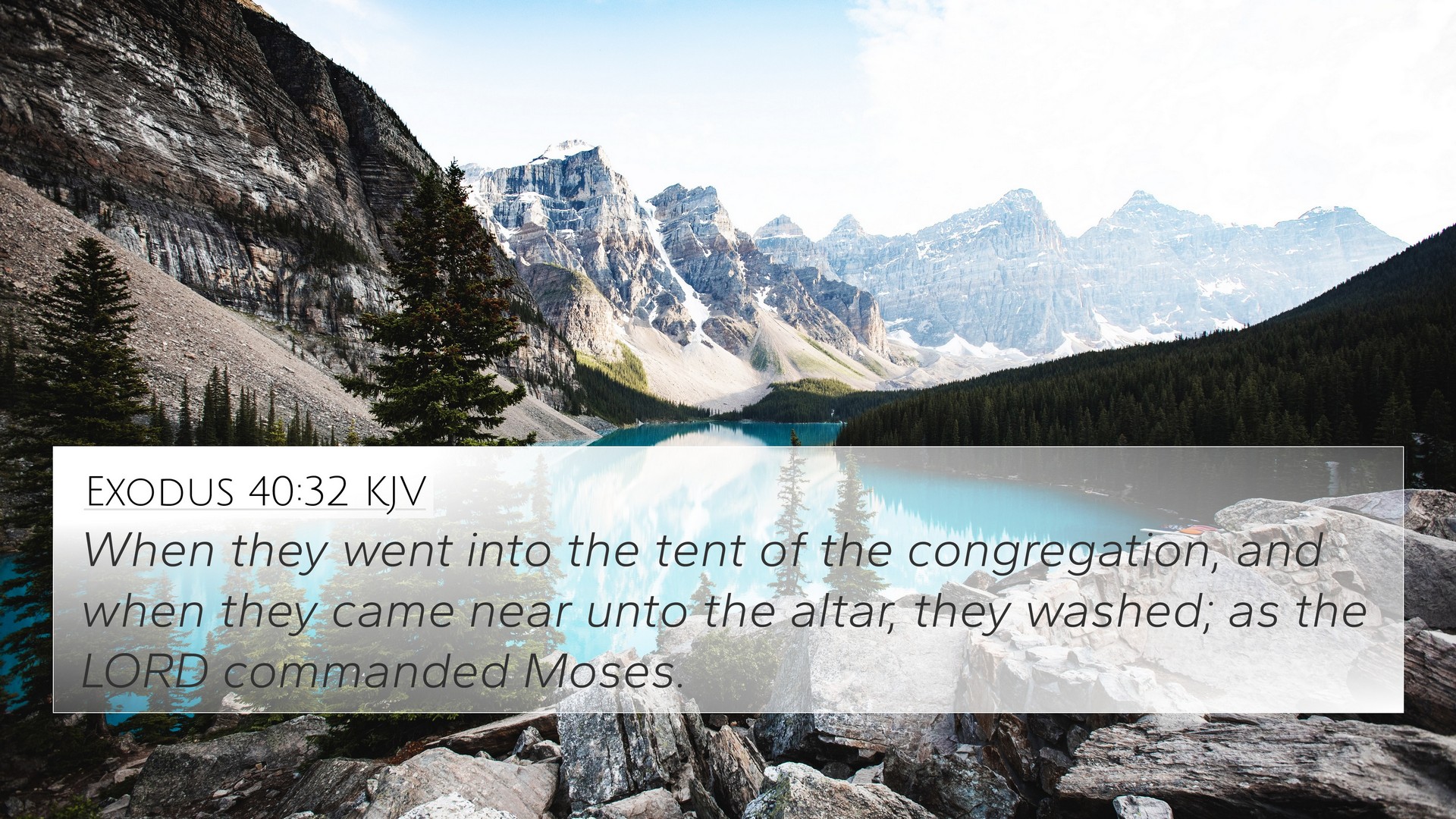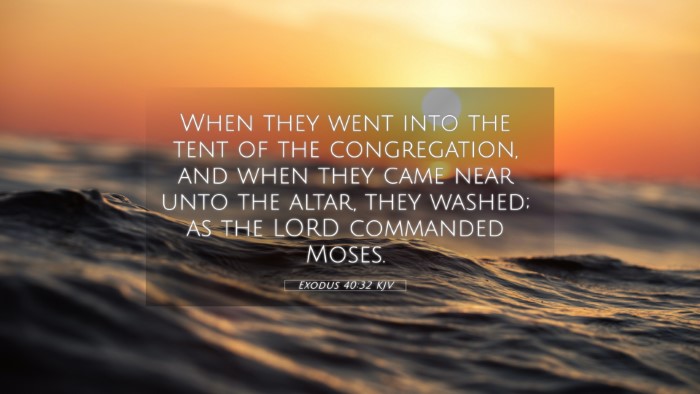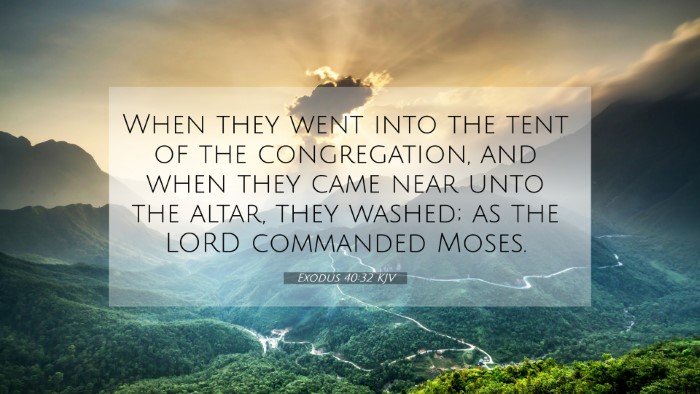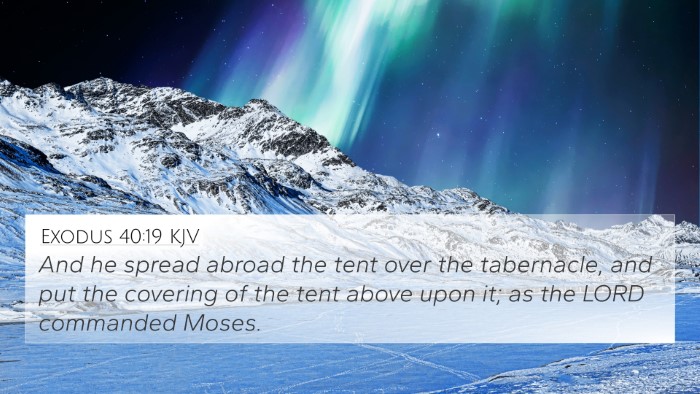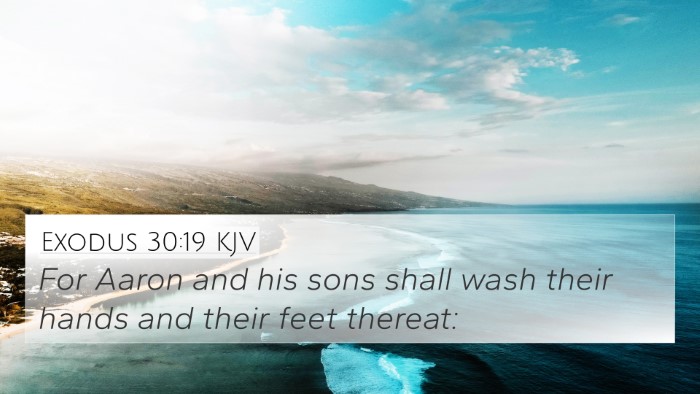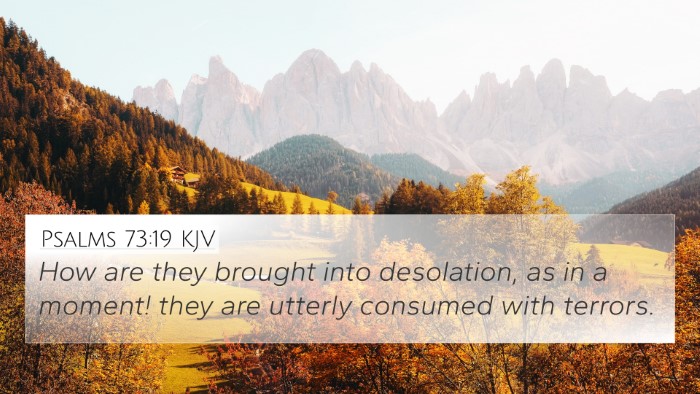Understanding Exodus 40:32
Exodus 40:32 states, "And when they went into the tent of the congregation, and when they came near unto the altar, they washed; as the LORD commanded Moses." This verse holds significant meaning within the broader context of the tabernacle and the priestly duties established in the Mosaic Law.
Context and Overview
This verse occurs at the culmination of the instructions given to Moses regarding the construction and dedication of the tabernacle. It highlights the importance of purity and obedience to God's commandments as the priests prepare to serve in the presence of the Lord.
Commentary Insights
Matthew Henry's Commentary
Matthew Henry emphasizes the obedience required in approaching God's service. The act of washing signifies spiritual cleanliness and the preparation required before ministering in holy roles. This ritual reflects the broader theme of sanctification in the presence of God.
Albert Barnes' Notes
Albert Barnes points out that the washing before entering the tent underscores the necessity of purification. He connects this act to the concept of being clean before approaching God, reflecting a deeper spiritual principle that reverberates throughout the Scriptures. This precept of cleanliness foreshadows the greater purification involving Christ's sacrifice.
Adam Clarke's Commentary
Adam Clarke elaborates on the symbolic significance of the altar and the act of washing. He notes that these cleansing rituals serve to reestablish the relationship between a holy God and His people. Clarke draws parallels to New Testament teachings, connecting this cleansing to the need for believers to be washed in the blood of Christ for spiritual purification.
Thematic Connections
This verse demonstrates a fundamental theme in the Bible regarding the necessity of cleanliness and consecration when approaching God. It sets the stage for understanding similar practices across various Biblical texts.
Related Bible Cross References
- Hebrews 9:22 - "And almost all things are by the law purged with blood; and without shedding of blood is no remission." This connects to the theme of purification required before God.
- 1 Peter 1:16 - "Because it is written, Be ye holy; for I am holy." This reflects the call to holiness that parallels the washing in Exodus.
- Leviticus 16:30 - "For on that day shall the priest make an atonement for you, to cleanse you, that ye may be clean from all your sins before the Lord." A direct link between cleansing rituals and God's forgiveness.
- John 13:10 - "Jesus said to him, He that is washed needeth not save to wash his feet, but is clean every whit: and ye are clean, but not all." A reference to spiritual cleansing in the New Testament.
- Matthew 5:8 - "Blessed are the pure in heart: for they shall see God." Emphasizes the notion of purity in approaching God.
- Psalm 51:7 - "Purge me with hyssop, and I shall be clean: wash me, and I shall be whiter than snow." A prayer for spiritual cleansing akin to the acts described in Exodus.
- James 4:8 - "Draw nigh to God, and he will draw nigh to you. Cleanse your hands, ye sinners; and purify your hearts, ye double minded." This verse encapsulates the heart of approaching God with purity.
Summary of Key Themes
This verse encapsulates several vital themes relevant to both the Old and New Testaments:
- Obedience to God: Reflecting the importance of following divine commands.
- Spiritual Cleansing: Highlighting the need for purity before serving God.
- Foreshadowing Christ: Prefiguring the ultimate sacrifice for cleansing from sin.
- Access to God: Denoting how holiness enables approach to the divine.
Prayer and Application
In applying the principles from Exodus 40:32, we are encouraged to seek personal purity and obedience in our spiritual lives. Reflecting on the need for cleansing and preparation allows us to approach God with reverence and sincerity.
Conclusion
Exodus 40:32 is rich with meaning, serving as a reminder of the importance of purity, obedience, and the sacrificial system instituted in the Old Testament, all of which find their fulfillment in Christ. In studying this verse, we engage in inter-Biblical dialogue that enriches our understanding of God's plan throughout Scripture.
